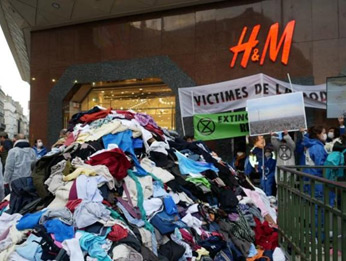Last month, the lower house of the French parliament proposed a new bill to crack down on fast fashion, aiming to curb the industry's unchecked growth and the immense damage it causes to the climate and environment. As the latest wave in a series of recent legislative movements in France, this bill hopes to address the insufficient regulation of the textile industry, though how to effectively enforce it remains uncertain.
According to this proposal, France will penalize fast fashion brands in the textile industry that have a negative impact on the climate with an increase of 10 euros per garment per year until 2030. This will effectively raise the operating costs for these companies in France. Additionally, the legislation will prohibit fast fashion companies from advertising in France and require them to display information on reuse, repair, recycling, and environmental impact of their products alongside price information on their websites and apps, making it easier for consumers to access this information during the purchasing process.
Last month, French politician Antoine Vermorel-Marques posted a video on TikTok promoting this legislation, in which he mimicked the "unboxing" videos of Shein packages to raise awareness about the chemicals involved in fast fashion production.

The proposal is the latest extension of a series of bills aimed at addressing the issue of textile waste in France. Other bills include the long-standing Extended Producer Responsibility Act, the AGEC Act promoting the circular economy and waste reduction, and the Corporate Sustainable Development Due Diligence Directive, also known as the CSDDD Directive, which is currently awaiting the final vote of the European Commission.
Meanwhile, in recent years, the United States has seen the emergence of many bills attempting to clean up the fashion industry. For instance, the California Garment Worker Protection Act was passed into law in 2022, while the New York Fashion Act and Fabric Act are trying to gain approval from legislators.
Industry observers say that the crackdown on fast fashion bills represents the French government's attempt to initiate defensive measures against the domestic fashion industry, which has been significantly impacted in recent years by the emergence of new flexible and ultra-fast fashion giants from the Chinese market. Companies like Shein and Temu, representing China, have forcefully entered the ranks of European fast fashion stalwarts such as Sweden's H&M Group and Spain's giant Inditex-owned Zara.

GlobalData's Retail Division General Manager, Neil Saunders, stated that it provides a useful tool to achieve France's goal of protecting its domestic market from the rise of fast fashion giants, including high-growth challengers like Shein. The proposal notes that this fast fashion giant, headquartered in Singapore, launches 7,200 new products every day.

"I hope the motives behind these policies to restrain fast fashion are to protect the environment and shield young people from the impact of aggressive marketing. However, at present, they mainly reflect a conservative, anti-China, and protectionist stance," said Elizabeth Cline, professor of fashion policy, consumerism, and sustainable development at Columbia University.
01.
The fuzzy definition of "fast fashion"
Some critics point out that the problems left by the French anti-fast fashion bill far outweigh those it can solve.
Greg Tulquois, a partner at the law firm EuroHua, has long provided marketing and advertising consulting services to consumer goods clients. He said it is currently unclear which layer of clothing retailers will be affected by the proposed law.
He explained that the terms and wording of the bill provide a very loose definition of fast fashion. According to the wording of the bill, fast fashion businesses specifically refer to those that distribute or sell large quantities of clothing, and the specific measurement thresholds will not be issued until the French government fully passes the bill. However, the setting of this threshold will take into account the number of new garments a company launches each day or the number of different styles, as well as the time from production to shelf.
Tulquois said that depending on the threshold used, the bill may only apply to ultra-fast fashion e-commerce platforms such as Shein and Temu, or it may also cover more traditional fast fashion companies, affecting Zara and H&M. "Some non-governmental environmental organizations have already indicated that they will push for the new law to apply to both fast fashion and ultra-fast fashion categories," he added.
Dr. Lu Sheng, Associate Professor and Director of Graduate Studies at the Department of Fashion and Apparel Studies at the University of Delaware, stated that the bill lacks a clear definition of fast fashion and does not specify who is responsible for tracking the sales of a clothing company to determine if it falls within the legal jurisdiction.
Dr. Lu further noted that due to frequent price adjustments by fashion retailers, sometimes several times a week, and price reductions during holiday seasons to boost sales, these fluctuations further blur the prospect of using prices to define fast fashion. He believes that effectively identifying the scope of products that should be subject to additional penalties and collecting these fees is a "huge challenge."
David Hachfeld, a textile expert at the Swiss environmental and social monitoring organization "Public Eye," stated that equating companies that produce large quantities of new styles over a period of time with fast fashion is difficult in practice. He questioned, "Is this definition too superficial in understanding the phenomenon of fast fashion?"
02.
Is it legal to restrain the development of fast fashion companies itself?
Dr. Lu Sheng also believes that the proposal may put France in a legal dilemma, especially if the government intends to prioritize domestic industries at the expense of industries in other countries.
Tulquois from the law firm Eurohua said that one of the most surprising aspects of the bill is the ban on advertising for fast fashion products, which he called an extreme measure. He believes that lawmakers could have banned certain advertisements or information aimed at stimulating negative environmental impacts, such as encouraging consumers to buy textiles frequently."
GlobalData's Sanders expressed that shutting down promotional channels would be devastating for companies like Shein and Temu, as these companies heavily rely on digital marketing to attract online shoppers to visit their apps and websites.
03.
What's the next step?
Whether this measure is truly effective remains to be seen. "France can enact any legislation it likes, but the fashion industry is global and interconnected," Sanders said. "French consumers could easily bypass this law by ordering fast fashion products from another EU country to be shipped to France. While traditional sales taxes would apply, there is still controversy over how France would impose additional taxes on items shipped from other EU countries."
Cline from Columbia University believes that the bill might backfire. "The danger of enacting policies targeting a specific corner of the fashion industry is that it may result in fragmented solutions with negative side effects," she said. "Companies will only find ways to work around it. We need policies that address the environmental and societal impacts of the entire clothing industry and ensure that all companies, regardless of their headquarters' location, adhere to the same standards."
Tulquois suggests that the fashion industry should prepare for the possibility of the EU following France. "The environmental laws passed in France over the past four years have incentivized the EU to adopt similar legislation as part of the EU Green Deal," he said. "This approach targeting fast fashion could potentially be 'exported' to other EU member states for coordination purposes."
Climate-KIC Holding B.V.'s Policy Director and EU Affairs Coordinator, Lisa Lang, stated that France will elect new members to the European Parliament this summer, indicating policymakers' desire to stand out in a politically charged year. "This also explains why they are now 'cracking down on a slew of globally top polluting companies with insufficient lobbying capabilities,'" Lang said. If this proposed law can truly support local brands committed to sustainable operations through reducing overproduction and focusing on sales markets, "then this might be a good start to proving 'sustainability means good business.'"
With the surge of generative artificial intelligence, data science, and artificial intelligence have once again become h...
Take moreNew Gap CEO Richard Dickson has spoken about his experience upon joining the struggling company from toy business Mattel...
Take moreShanghai Manxuan Industry Co., Ltd(SWS), a pioneer in zipper manufacturing, is proud to announce the construction of a c...
Take more